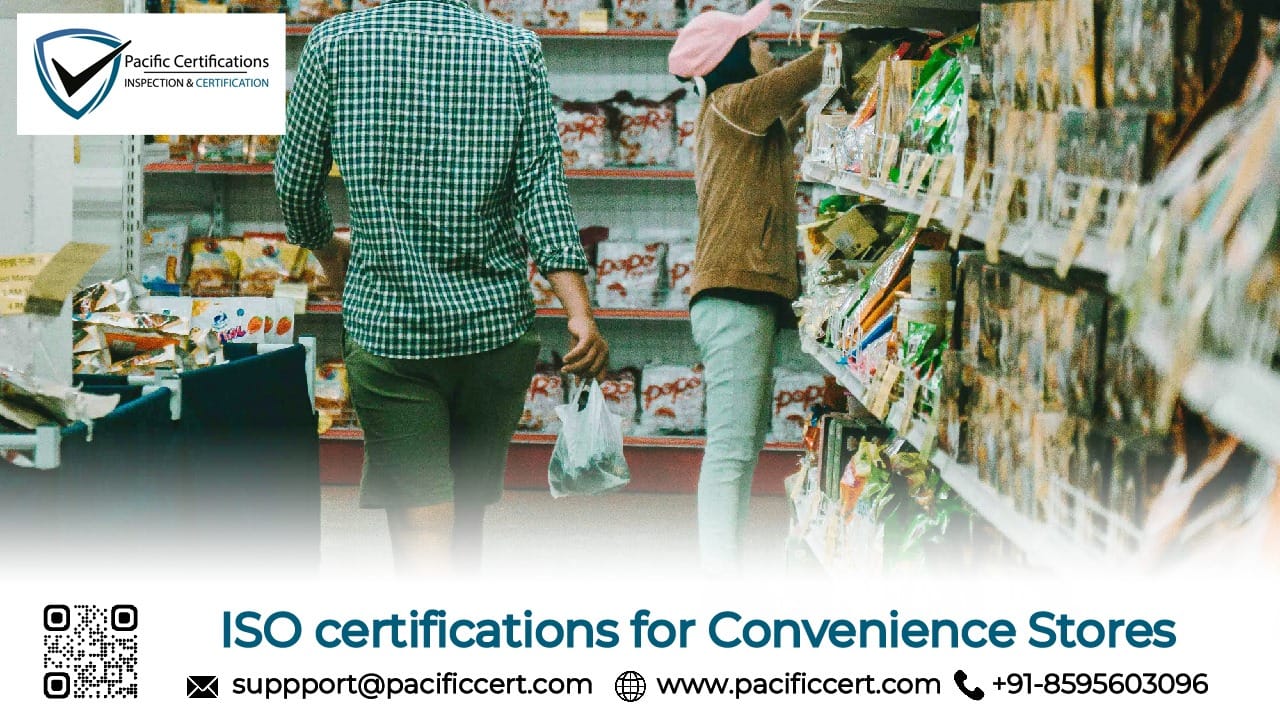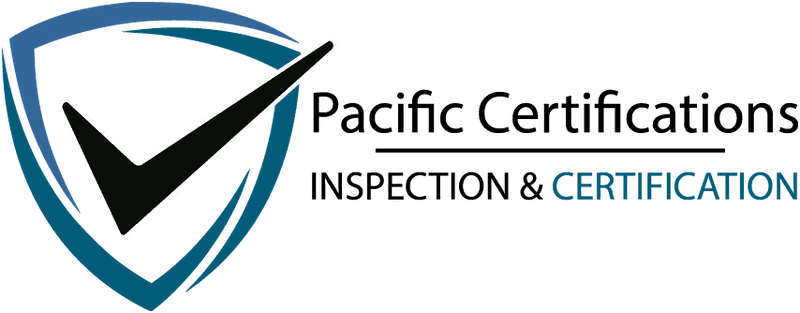ISO Certifications for Convenience Stores, Requirements and Benefits

Convenience stores are essential in today’s fast-paced world, providing quick access to a broad range of goods and services. As customer expectations continue to rise, it's crucial for convenience stores to adopt strategies that guarantee quality and efficiency. One powerful way to achieve this is through ISO certifications.
International Organization for Standardization, offers globally recognized standards that give businesses the framework they need to follow industry best practices. For convenience stores, obtaining ISO certifications can enhance operational efficiency, ensure food safety, boost customer satisfaction and showcase a strong commitment to quality.
If you're seeking ISO certification for your convenience store, we at Pacific Certifications are here to help. You can reach out to us via email at [email protected]!
Applicable ISO Standards for Convenience Stores
- ISO 9001:2015 – Quality Management Systems (QMS):ISO 9001 is the world’s most recognized standard for quality management. It outlines the criteria for a quality management system, emphasizing a strong customer focus and continual improvement.
- ISO 14001:2015 – Environmental Management Systems (EMS): ISO 14001 offers a framework for businesses to enhance their environmental performance. For convenience stores, this can translate to better resource efficiency, waste reduction and responsible product sourcing.
- ISO 22000:2018 – Food Safety Management Systems (FSMS): Food safety is a critical concern for convenience stores that offer perishable items. ISO 22000 specifies the requirements for a food safety management system, helping stores identify and manage food safety hazards.
- ISO 45001:2018 – Occupational Health and Safety Management Systems (OHSMS): ISO 45001 provides a structured framework for managing occupational health and safety risks, helping stores establish a safe working environment.
- ISO 27001:2022 – Information Security Management Systems (ISMS): ISO 27001 provides a comprehensive framework for managing information security, helping organizations safeguard critical assets like customer data, financial information, and employee records.
- ISO 50001:2018 – Energy Management Systems (EnMS): ISO 50001 provides a framework for developing an energy management system, helping stores manage energy use more effectively. By implementing this standard, convenience stores can reduce energy costs and minimize their environmental impact.
Click here to find out more applicable standards to your industry
For expert assistance with ISO certification for your Convenience Store, reach out to us at [email protected].
How We Can Help
At Pacific Certifications, we specialize in providing certification services for a wide range of ISO standards. As a certification body, our role is to conduct thorough audits of your business processes to ensure they meet the requirements of the applicable ISO standards.
Our experienced auditors work closely with your team to understand your operations and identify areas of compliance with ISO standards. We provide a transparent and rigorous certification process ensuring that your convenience store meets international standards of quality and efficiency.
Secure ISO certification for your Convenience Store by contacting us at [email protected] or +91-8595603096.
Requirements of ISO Certifications for Convenience Stores
To achieve ISO certification, convenience stores must meet specific requirements outlined in the relevant ISO standards. Here’s a breakdown of what is typically required:
ISO 9001:2015 – Quality Management Systems (QMS):
- Development and documentation of a quality management system that includes processes for continuous improvement.
- Commitment from top management to support and promote the quality management system.
- A focus on customer satisfaction and meeting regulatory requirements.
- Regular internal audits and reviews to ensure ongoing compliance with the standard.
ISO 14001:2015 – Environmental Management Systems (EMS):
- Identification of environmental aspects and impacts associated with the store’s operations.
- Establishment of environmental objectives and targets.
- Implementation of environmental management programs to achieve these objectives.
- Regular monitoring, measurement, and evaluation of environmental performance.
ISO 22000:2018 – Food Safety Management Systems (FSMS):
- Implementation of a food safety policy that outlines the store’s commitment to food safety.
- Establishment of a food safety team with defined roles and responsibilities.
- Conducting hazard analysis and implementing control measures at critical points.
- Regular verification and validation of food safety management systems.
ISO 45001:2018 – Occupational Health and Safety Management Systems (OHSMS):
- Identification of occupational health and safety risks in the workplace.
- Implementation of controls to mitigate these risks.
- Training and awareness programs for employees on health and safety practices.
- Monitoring and review of health and safety performance.
ISO 27001:2022 – Information Security Management Systems (ISMS):
- Development of an information security management policy.
- Identification and assessment of information security risks.
- Implementation of controls to protect information assets.
- Regular review and improvement of information security practices.
Get started with ISO certification for your Convenience Store, contact us at [email protected] or +91-8595603096 today.
Benefits of ISO Certifications for Convenience Stores
Each ISO standard offers unique benefits that can enhance various aspects of your convenience store's operations. Below is an overview of the benefits:
- ISO 9001 emphasizes a customer-focused approach, ensuring that your products and services consistently meet or exceed customer expectations.
- ISO standards encourage the use of data-driven decision-making.
- ISO certification serves as a mark of quality, distinguishing your store from competitors.
- The ISO standards help ensure that your store complies with relevant regulatory and statutory requirements.
- ISO 14001 provides a framework for identifying and managing environmental aspects of your business.
- Implementing ISO 14001 can lead to cost savings through more efficient use of resources, such as energy and raw materials. Reducing waste and improving resource efficiency directly impacts your bottom line.
- ISO 22000 provides a comprehensive framework for managing food safety hazards, ensuring that the food products sold in your store are safe for consumption.
- ISO 45001 provides a structured approach to identifying and mitigating health and safety risks in the workplace.
- ISO 27001 helps safeguard sensitive information including customer data from security breaches and cyber threats.
- ISO 50001 helps your store manage energy use more efficiently, leading to significant cost savings on energy bills.
By adopting these ISO standards, your convenience store can achieve operational excellence, ensure customer satisfaction and enhance sustainability. To achieve ISO certification for your Convenience Store, connect with us at [email protected].
Market News
Lately, the convenience store industry is driven by technological advancements, changing consumer behavior and increasing regulatory scrutiny. The adoption of ISO standards is becoming more widespread as businesses seek to enhance their operations and improve sustainability.
There is a growing emphasis on food safety and hygiene in the wake of the global pandemic. Consumers are more concerned than ever about the safety of the food they purchase and ISO 22000 certification is increasingly seen as a mark of trustworthiness.
Sustainability is also a key trend, with more convenience stores adopting ISO 14001 and ISO 50001 standards to reduce their environmental impact. This is in response to both consumer demand for greener practices and regulatory pressures to minimize carbon footprints.
Furthermore, the digitalization of convenience stores is leading to increased focus on information security, making ISO 27001 certification a critical consideration for businesses that handle customer data and engage in online transactions.
Looking to certify your Convenience Store with ISO standards? Email us at [email protected] or call +91-8595603096.
Certification Process
Achieving ISO certification involves several steps designed to ensure that your convenience store meets the necessary standards. Here’s an overview of the certification process:
Step 1: Understanding the Standards
- Begin by familiarizing yourself with the relevant ISO standards and their requirements.
Step 2: Gap Analysis (Optional)
- You may choose to conduct an internal gap analysis to identify areas where your current practices fall short of the ISO requirements.
Step 3: Implementation
- Implement the necessary changes to align your processes with the ISO standards.
Step 4: Internal Audit
- Conduct an internal audit to evaluate the effectiveness of the implemented changes and ensure that all requirements are being met..
Step 5: Certification Audit
- Engage Pacific Certifications to conduct a formal certification audit. Our auditors will review your documentation, interview staff, and inspect your operations to verify compliance with the ISO standards.
Step 6: Certification Decision
- Based on the audit findings, we will make a certification decision. If your convenience store meets the requirements, we will issue an ISO certificate that is valid for three years, subject to annual surveillance audits.
Step 7: Continuous Improvement
- To maintain your certification, you must undergo regular surveillance audits.
Ready to take your convenience store to the next level with ISO certification? At Pacific Certifications, we are committed to helping you achieve and maintain the highest standards of quality and sustainability!
Pacific Certifications is accredited by ABIS, in case you need support with ISO certification for your Convenience Store, please contact us at [email protected] or +91-8595603096.
FAQs: ISO Certifications for Convenience Stores
Q1: What is the most relevant ISO certification for a convenience store?
The most relevant ISO certifications for convenience stores include ISO 9001 for quality management, ISO 22000 for food safety, ISO 45001 for occupational health and safety, ISO 14001 for environmental management, and ISO 27001 for information security.
Q2: How long does it take to achieve ISO certification for a convenience store?
The timeline for achieving ISO certification can vary depending on the size and complexity of your operations, as well as the specific ISO standard. Typically, the process can take anywhere from three to six months from the start of implementation to the final certification audit.
Q3: Can I conduct a gap analysis myself before seeking certification?
Yes, you can conduct an internal gap analysis to identify areas where your store’s operations do not meet the requirements of the ISO standards. This can help you prepare for the certification process, although this step is not mandatory.
Q4: What happens if my store fails the certification audit?
If your store does not meet the ISO requirements during the certification audit, we will provide a detailed report outlining the non-conformities. You will have the opportunity to address these issues and request a follow-up audit once the necessary improvements have been made.
Q5: How often are ISO surveillance audits conducted?
After initial certification, ISO surveillance audits are typically conducted annually to ensure ongoing compliance with the standards. These audits are less comprehensive than the certification audit but are essential for maintaining your certification.
Read More at: Blogs by Pacific Certifications

